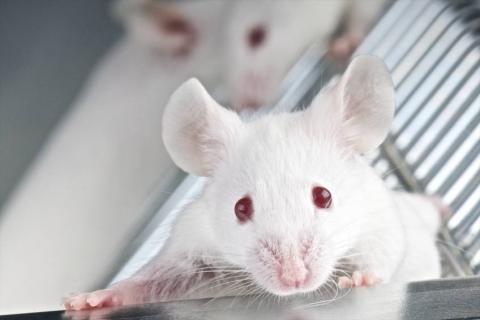Health Research Institute of Santiago de Compostela (IDIS)
If you are the contact person for this centre and you wish to make any changes, please contact us.
Member of SEEDO and Head of Epigenomics in the Endocrinology and Nutrition Group of the Epigenomics Unit at the Santiago Health Research Institute (IDIS), Santiago University Hospital Complex (CHUS)
Researcher in Population Genetics in Biomedicine at the Instituto de Investigación Sanitaria de Santiago de Compostela (IDIS) and Professor at the Faculty of Medicine of the University of Santiago de Compostela
Lead researcher of the Psychiatric Genetics group at the Health Research Institute of Santiago de Compostela (IDIS) and member of the Research Network on Addiction Primary Care (RIAPAd)
Director of the Endocrine Physiopathology Research Group at the Health Research Institute of Santiago de Compostela (IDIS).
CNB-CSIC Scientific Researcher at the CiMUS of the University of Santiago de Compostela, IDIS. Laboratory of Cell Senescence, Cancer and Aging

A meta-analysis published in the Cochrane Database of Systematic Reviews concludes that intermittent fasting is not particularly effective for weight loss in adults who are obese or overweight, who showed moderate weight loss. This strategy also does not differ significantly from standard dietary advice or improvement in quality of life. The review included 22 studies with nearly 2,000 participants and evaluated various forms of intermittent fasting, including restricting food intake for most of the day and fasting every other day.

A large international study has analyzed genomic data from over one million people with 14 different psychiatric disorders, such as depression, anxiety, and schizophrenia. According to their analysis, five groups of diseases can be identified that share a significant number of genetic variants. Furthermore, common genetic markers were detected among these 14 disorders. The results are published in the journal Nature.

Several studies have suggested that taurine concentrations in the blood decrease with age and that supplementation with this amino acid could delay ageing. Now, a study carried out in the USA with Spanish participation, including data from humans, monkeys and mice, shows that this decline is not systematic and that it depends more on individual factors than on ageing, so taurine is not a reliable marker of ageing. The results are published in the journal Science.

Research has analyzed how extreme heat influences the biological age of elderly populations, specifically in the United States. The study, published in Science Advances, used blood samples from more than 3,600 adults with an average age of 68 collected between 2010 and 2016. The team compared epigenetic aging trends with the number of days of extreme heat in the participants' places of residence. The models showed that more days of heat or long-term heat — over a period of one to six years — increased the biological age of the participants by more than two years.

An international team has analyzed data from nearly half a million people to analyze the influence of genes or environment on mortality, age-related diseases and aging. Although the relationship may vary according to the type of disease, their conclusions are that the environment -especially socioeconomic conditions, smoking habits and physical exercise- has a much greater influence than genetics in all the aspects studied. Among other data, environment explains 17 % of the variation in mortality risk, while genetics is limited to 2 %. The results are published in the journal Nature Medicine.

A team of researchers led by the Max Planck Institute for Evolutionary Anthropology in Germany has analysed nearly 10,000 ancient genomes and found six cases of people with Down's syndrome and one with Edwards' syndrome. Most of them died before or shortly after birth. The findings correspond to different periods up to 5,500 years old and several of them have been found in Navarra. According to the authors, "the care with which the burials were carried out and the objects found with these individuals indicate that ancient societies probably treated people with trisomies 18 and 21 as members of their communities". The findings are published in Nature Communications.

The largest meta-analysis to date that studies the risk of children of people with a mental disorder also suffering from some type of mental disorder during their lifetime has been published, with Spanish participation. According to the study, the risk is more than double that of the rest of the population. To explain the study and resolve any doubts that may arise, the Science Media Centre Spain organised an information session with one of the authors, psychiatrist Joaquim Raduà.

An international team, led by the Hospital Clínic-IDIBAPS in Barcelona together with King's College London (UK) and Dalhousie University (Canada), has published the largest meta-analysis to date studying the risk of children of people with mental disorders developing the same, or another type of disorder. The study included more than three million children of parents with different types of disorders and more than 20 million people as a control population. The results, published in the journal World Psychiatry, indicate that, overall, the former have a 1.5 to 3 times higher risk of developing a disorder in their lifetime. According to the authors, in the case of bipolar, depressive or anxiety disorders, the risk of their offspring suffering from some type of disorder is more than 50%.

A study of more than 5,000 patients has developed a method to predict the biological age of our organs. They have analysed more than 4,000 proteins present in the blood and used machine learning models adapted to 11 different organs. According to the authors, almost 20 % of the population has accelerated organ ageing, which in many cases is associated with an increased risk of mortality of between 20 and 50 %. The results are published in the journal Nature.

A study published by the company Rejuvenate Bio claims to have prolonged the life expectancy of healthy older mice, while improving other health parameters. The study used a gene therapy—introducing three genes, known as Yamanaka factors, that are particularly active in embryonic cells. According to the authors, the remaining life expectancy of the mice (whose age was equivalent to about 77 years in humans) was doubled, with a 7% increase in absolute terms. The results have been shared in a pre-print publication and have not yet been peer-reviewed.